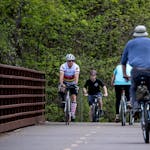Mandatory vaccines are two words that course through discussions about fundamental things people do, from going to school to dining out.
The matter of who has and who hasn't received the COVID-19 vaccine — and possible restrictions on the latter — has worked itself into the popular sport of road running, heightened by a blog post in the New York Times' popular running newsletter Monday. The theme: Should races, especially major ones, require all participants be vaccinated? Unsurprisingly the answer is complicated, as the heavyweights of marathoning have learned.
Responded Ted Metellus, the New York City Marathon race director: "We are not in a position to force or mandate for people to take the vaccines, but what we can do is say, 'These are the requirements.' "
Last week, New York announced a reduced field, 33,000 instead of its usual 55,000, for November, with plans for a staggered start. Details are to come, but organizers plan to require runners show proof of vaccination or proof of a negative COVID test near race day, and other safety procedures. And the Boston Marathon is back, too, moved from April to October this year.
Grandma's Marathon in Duluth is less than a month away. It was forced to cancel its popular race last year for the first time in 44 years, and it needed to redesign this year's version to meet safety protocols at the time when it rolled out registration late last year.
This year's race weekend will feature three distances over two days, with reduced fields: 4,000 in the marathon, 4,000 in the half-marathon and 1,500 in the 5-kilometer race.
Grandma's media director Zach Schneider said the topic of vaccinations came up when the organizers began planning last year, but "it's never been logistically possible." Plus, vaccine shots weren't widespread and available at the time, he added.
Mary Anderson runs Anderson Race Management, which had 90% of its 200-plus events canceled or virtual in 2020. She already has coordinated several runs this spring, ones modified to accommodate state protocols such as keeping gatherings to 250, running "pods" to keep participants distanced, and more.
Anderson said what she can control is requiring her staff and volunteers to be healthy at events. Runners? Too hard to manage, among other issues.
"It would it be an administrative nightmare," she said. "Sometimes when you take those things all on, it becomes more of a liability."
What's more, Anderson and Schneider said race planning has become a lesson in adaptation as the state modifies what's acceptable. Grandma's recently announced spectators are allowed after all.
"We have gone from zero to 60 in a short time frame," Anderson said, "but we'll take that any day."
Standing pat
Long-planned events can't readily adjust on the fly or, as in Grandma's case, don't intend to even while the state removed capacity limits and distancing requirements for outdoor events.
Marathon runners, for example, still will experience "a rolling start," Schneider said. Highly choreographed, they'll arrive in Two Harbors by bus in groups of up to 35 (and masks required) and then be encouraged toward the race corral to separated lanes at the start line, where they'll begin their 26.2-mile race five at a time.
By lengthening the process at the start and with a reduced field, organizers expect to fan out the numbers on the course and, by extension, thin out the usual gathering at the finish in Canal Park.
The Minnesota Running Industry Task Force, of which Grandma's, Twin Cities in Motion and others are members, has supplied state health officials with crowd science data to buttress their event plans. Too, there are reports like the one in Runner's World magazine that minimize the threat of outdoors racing events. A study by the Japanese Association of Athletics Federations of 1,118 races between April 2020 and March 31, 2021, in Japan, found just two confirmed COVID-19 cases linked to the events.
Vaccinated or not, runners should feel comfortable on race weekend, Schneider said. Organizers have set up guardrails to make the races "inclusive," knowing there will be participants who want to run with family and friends and others who want to keep a distance.
One of the biggest U.S. race weekends since the pandemic struck, Grandma's is on the radar of other race organizers as a test case, to see how its plan works to keep runners safe.
"If people piggyback on it, then great," Schneider said. "We want people to have a good experience … it's a chance to do a really big thing but to do it well."
Bob Timmons • 612-673-7899





